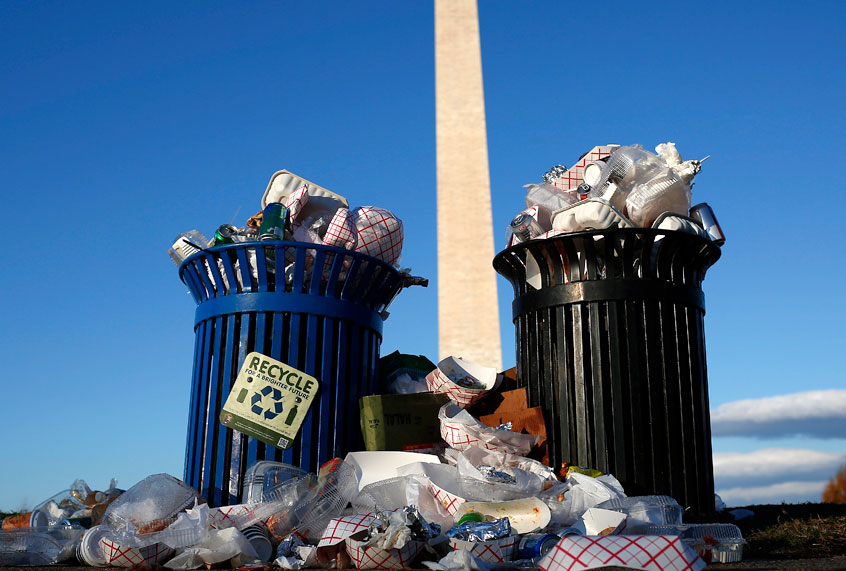When the federal government shut down in 2013 during a standoff between then-president Obama and the Republican-controlled Congress, the administration made the decision to close national parks — a decision which prompted harsh criticism from the GOP at the time. In stark contrast, national parks have not closed their doors during the current shutdown under Trump, despite being understaffed or unstaffed — prompting horrifying reports of trash and even human waste build-up at America’s once-pristine preserves.
Now, it turns out that decision to leave parks open might have long-term consequences, both ecological and physical, that persist long after the shutdown ends.
Jon Jarvis, the former National Park Service director under the Obama administration and current Executive Director of the Institute for Parks, People, and Biodiversity at the University of California-Berkeley, tells Salon the move to keep many of the parks open is “political” and “a mistake.”
“We were faced with in some ways a more complicated situation in 2013 when the government shut down, because it was October rather than December, and in October there is still a high-level of visitation activity in the entire National Park system,” he said. “But since 90 percent of the staff were on furlough and fully staffed parks — of hundreds of workers — were down to a few employees, we decided the best course of action to protect the parks and keep them safe was to close them,” Jarvis explained of the Obama administration’s decision to close them during 2013’s shutdown.
While most parks have remained opened and free for the public to visit, bathrooms are closed, garbage isn’t being managed, and wildlife isn’t being watched. In other words, it is a free-for-all, and that is not good news. Jarvis isn’t the only one who believes it was a mistake to keep the parks open and understaffed. Diane Regas, the CEO of the Trust for Public Land, wrote a letter to President Donald Trump requesting to close national parks until the government reopens.
“I think that closing the parks when they weren’t staffed … would have been a better approach,” Regas told Salon.
In response to recent criticism, the Department of the Interior announced they would be tapping into entrance fees to pay for trash clean up, restroom maintenance, and additional law enforcement. But some say allocating those funds could hurt future projects — such as the massive clean-up that will happen once the government reopens. On an average day, national parks are expected to collect $400,000 in fee revenue, which is being lost each day the parks are closed.
“National parks were expected to collect $310 million in fees in 2018. While this amount is less than 13% of the agency’s annual operating funds from Congress, the money goes a long way in many parks,” Theresa Pierno, President and CEO for National Parks Conservation Association, said in a statement. “Diverting this money will dig our parks into an even bigger financial hole. This will hurt rangers, parks, visitors and the tourism economy long after the shutdown is over.”
Regas tells Salon the true impact of the shutdown and abuse many parks have endured will only be available once an assessment is done after the government reopens, but there are some that can already be anticipated.
“The long-term impacts we need to be concerned about include vandalism in the parks,” Regas said. “We know that in some cases there has been vandalism in Joshua Tree… some trees have been [cut] down, and that will take many years to recover from.”
There have also been reports of illegal off-roading, which can damage sensitive ecosystems and soils, she said.
In the Great Smoky Mountains National Park, black bears may get accustomed to digging through the pounds and pounds of human food in garbage, which could lead to them being euthanized.
“Once the parks reopen, the cleanup will be more than cleaning the bathrooms and taking out the garbage,” Don Barger, the Southeast Regional Director of National Parks Conservation Association, told Salon. “Access to a park that isn’t properly staffed creates a major problem for black bears and people that is dangerous… [if] black bears [get] habituated to garbage as a food source, that would counter decades of work.”
This could increase the risk of encounters between bears and people, Barger said.
“Once they become habituated to human food and see it as an easy source of calories they start showing up at campgrounds and they lose their fear of people,” he said. “Then they have 300-pound bear roaming around the campground trying to get your picnic basket from you.”
Barger emphasized that habituation is usually irreversible, and often results in the bears being euthanized. He said that restoring the population of Black Bears in the Smoky Mountains has been a “decades-long” project that required intensive management by National Parks service rangers.
“I think one of the lessons is that it is difficult to run a partially open park,” he said.
Regas said she fears the accrued damage could mean that Congress will have to allocate disaster relief–like funds to help restore parks.
“Congress will need to concede supplemental appropriation, much like when a hurricane hits a national park,” she said. “ I think after this shutdown they will need to do an assessment of the damage that will need special attention.”
Fortunately, there have been reports of good citizens trying to do what they can and clean up some national parks, like the volunteers from the Ahmadiyya Muslim Youth Association who have held cleanup days.


